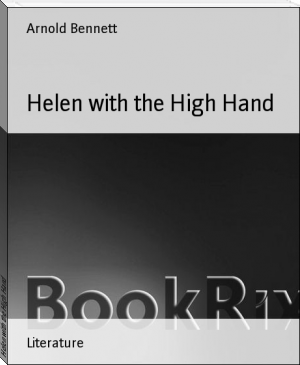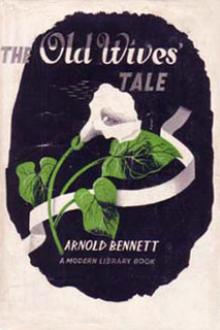Helen with the High Hand - Arnold Bennett (debian ebook reader .txt) 📗

- Author: Arnold Bennett
Book online «Helen with the High Hand - Arnold Bennett (debian ebook reader .txt) 📗». Author Arnold Bennett
Wilbraham Hall, once he became its owner, would be a worry--an awful worry. Well, would it? Would not Helen be entirely capable of looking after it, of superintending it in every way? He knew that she would! As for the upkeep of existence in Wilbraham Hall, had not Helen proved to him that its cost was insignificant when compared to his income? She had.
And as to his own daily manner of living, could he not live precisely as he chose at Wilbraham Hall? He could. It was vast; but nothing would compel him to live in all of it at once. He could choose a nice little room, and put a notice on the door that it was not to be disturbed. And Helen could run the rest of the mansion as her caprice dictated.
The process of argument was over when Helen descended to put the finishing touches to a breakfast which she had evidently concocted with Georgiana the night before.
"Breakfast is ready, uncle," she called to him.
He obeyed. Flowers on the table once more! The first since her departure! A clean cloth! A general, inexplicable tuning-up of the meal's frame.
You would now, perhaps, have expected him to yield, as gracefully as an old man can. He wanted to yield. He hungered to yield. He knew that it was utterly for his own good to yield. But if you seriously expected him to yield, your knowledge of human nature lacks depth. Something far stronger than argument, something far stronger than desire for his own happiness, prevented him from yielding. Pride, a silly self-conceit, the greatest enemy of the human race, forbade him to yield. For, on the previous night, Helen had snubbed him--and not for the first time. He could not accept the snub with meekness, though it would have paid him handsomely to do so, though as a Christian and a philosopher he ought to have done so. He could not.
So he put on a brave face, pretended to accept the situation with contented calm, and talked as if Canada was the next street, and as if her going was entirely indifferent to him. Helen imitated him.
It was a lovely morning; not a cloud in the sky--only in their hearts.
"Uncle!" she said after breakfast was done and cleared away.
He was counting rents in his cashbox in the front parlour, and she had come to him, and was leaning over his shoulder.
"Well, lass?"
"Have you got twenty-five pounds in that box?"
It was obvious that he had.
"I shouldna' be surprised," said he.
"I wish you'd lend it me."
"What for?"
"I want to go over to Hanbridge and book my berth, definitely, and I've no loose cash."
Now here was a chance to yield. But no.
"Dost mean to say," he exclaimed, "as ye havena' booked your berth? When does th' steamer sail?"
"There's one from Glasgow next Saturday," said she--"the _Saskatchewan_. I secured the berth, but I didn't pay for it."
"It's a rare lot of money," he observed.
"Oh," she said, "I didn't want all that for the fare. I've other things to pay for--railway to Glasgow, etc. You will lend it me, won't you?"
Her fingers were already in the cashbox. She was behaving just like a little girl, like a spoilt child. It was remarkable, he considered, how old and mature Helen could be when she chose, and how kittenish when she chose.
She went off with four five-pound notes and five sovereigns. "Will you ask me to come back and cook the dinner?" she smiled, ironically, enchantingly.
"Ay!" he said. He was bound to smile also.
She returned in something over two hours.
"There you are!" she said, putting a blue-green paper into his hand. "Ever seen one of these before?"
It was the ticket for the steamer.
This staggered him. A sensible, determined woman, who disappears to buy a steamer-ticket, may be expected to reappear with a steamer-ticket. And yet it staggered him. He could scarcely believe it. She was going, then! She was going! It was inevitable now.
"The boat leaves the Clyde at ten in the morning," she said, resuming possession of the paper, "so we must go to Glasgow on Friday, and stop the night at an hotel."
"We?" he murmured, aghast.
"Well," she said, "you surely won't let me travel to Glasgow all alone, will you?"
"Her's a caution, her is!" he privately reflected.
"You can come back on Saturday," she said; "so that you'll be in time to collect your rents. There's an express to Glasgow from Crewe at 1.15, and to catch that we must take the 12.20 at Shawport."
She had settled every detail.
"And what about my dinner?" he inquired.
"I'm going to set about it instantly," laughed she.
"I mean my dinner on Friday?" he said.
"Oh, _that_!" she replied. "There's a restaurant-car from Crewe. So we can lunch on the train."
This idea of accompanying her to Glasgow pleased him intensely. "Glasgow isna' much i' my line," he said. "But you wenches do as ye like, seemingly."
Thus, on the Friday morning, he met her down at Shawport Station. He was in his best clothes, but he had walked. She arrived in a cab, that carried a pagoda of trunks on its fragile roof; she had come straight from her lodgings. There was a quarter of an hour before train-time. He paid for the cab. He also bought one second-class single and one second-class return to Glasgow, while she followed the porter who trundled her luggage. When he came out of the booking-office (minus several gold pieces), she was purchasing papers at the bookstall, and farther up the platform the porter had seized a paste-brush, and was opening a cupboard of labels. An extraordinary scheme presented itself to James Ollerenshaw's mind, and he trotted up to the porter.
"I've seen to the baggage myself," said Helen, without looking at him.
"All right," he said.
The porter touched his cap.
"Label that luggage for Crewe," he whispered to the porter, and passed straight on, as if taking exercise on the platform.
"Yes, sir," said the porter.
When he got back to Helen of course he had to make conversation with a nonchalant air, in order to hide his guilty feelings.
"So none of 'em has come to see you off!" he observed.
"None of whom?"
"None o' yer friends."
"No fear!" she said. "I wouldn't have it for anything. I do hate and loathe good-byes at a railway station. Don't you?"
"Never had any," he said.
The train was prompt, but between Shawport and Crewe it suffered delays, so that there was not an inordinate amount of time to spare at the majestic junction.
Heedless, fly-away creature that she was, Helen scurried from the North Stafford platform to the main-line platform without a thought as to her luggage. She was apparently so preoccupied with her handbag, which contained her purse, that she had no anxiety left over for her heavy belongings.
As they hastened forward, he saw the luggage being tumbled out on to the platform.
The Glasgow train rolled grandiosely in, and the restaurant-car came to a standstill almost exactly opposite the end of the North Stafford platform. They obtained two seats with difficulty. Then, as there was five minutes to wait, Jimmy descended from the car to the asphalte and peeped down the North Stafford platform. Yes, her luggage was lying there, deserted, in a pile. He regained the carriage.
"I suppose the luggage will be all right?" Helen said, calmly, just as the guard whistled.
"Ay!" said he, with the mien of a traveller of vast experience. "I saw 'em bringing all th' N.S. luggage over. It were th' fust thing I thought of."
As a liar he reckoned he was pretty good.
He glanced from the window as the train slid away from Crewe, and out of the tail of his eye, in the distance, over the heads of people, he had a momentary glimpse of the topmost of Helen's trunks safely at rest on the North Stafford platform.
He felt safe. He felt strangely joyous. He ate largely, and made very dry, humorous remarks about the novelty of a restaurant on wheels.
"Bless us!" he said, as the express flashed through Preston without stopping. "It's fust time as I've begun a bottle o' Bass in one town and finished it in another."
He grew positively jolly, and the journey seemed to be accomplished with the rapidity of a dream.
CHAPTER XIX
THE TOSSING
"You said you'd seen it into the van," pouted Helen--she who never pouted!
"Nay, lass," he corrected her, "I said I'd seen 'em bringing all th' luggage over."
The inevitable moment of reckoning had arrived. They stood together on the platform of St. Enoch's, Glasgow. The last pieces of luggage were being removed from the guard's van under the direction of passengers, and there was no sign whatever of Helen's trunks. This absence of Helen's trunks did not in the least surprise James Ollerenshaw; he was perfectly aware that Helen's trunks reposed, at that self-same instant, in the lost luggage office at Crewe; but, of course, he had to act surprise. In case of necessity he could act very well. It was more difficult for him to act sorrow than to act surprise; but he did both to his own satisfaction. He climbed into the van and scanned its corners--in vain. Then, side by side, they visited the other van at the head of the train, with an equal result.
The two guards, being Scotch, responded to inquiries with extreme caution. All that they would answer for was that the trunks were not in the train. Then the train was drawn out of the station by a toy-engine, and the express engine followed it with grave dignity, and Helen and Jimmy were left staring at the empty rails.
"Something must be done," said Helen, crossly.
"Ay!" Jimmy agreed. "It's long past my tea-time. We must find out if there's anything to eat i' Scotland."
But Helen insisted on visiting the stationmaster. Now, the stationmaster at St. Enoch's is one of





Comments (0)